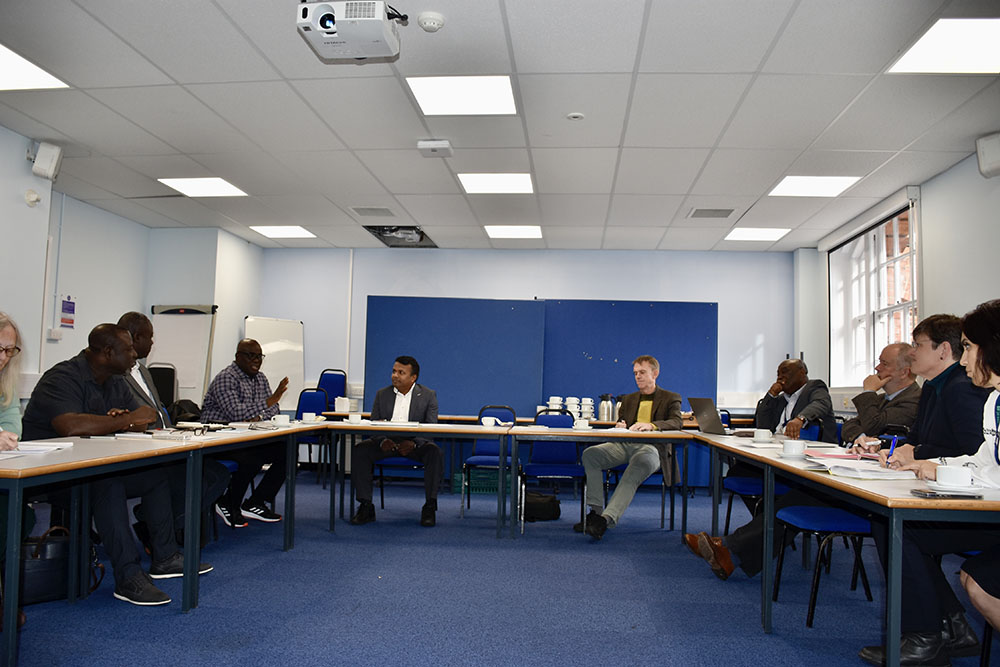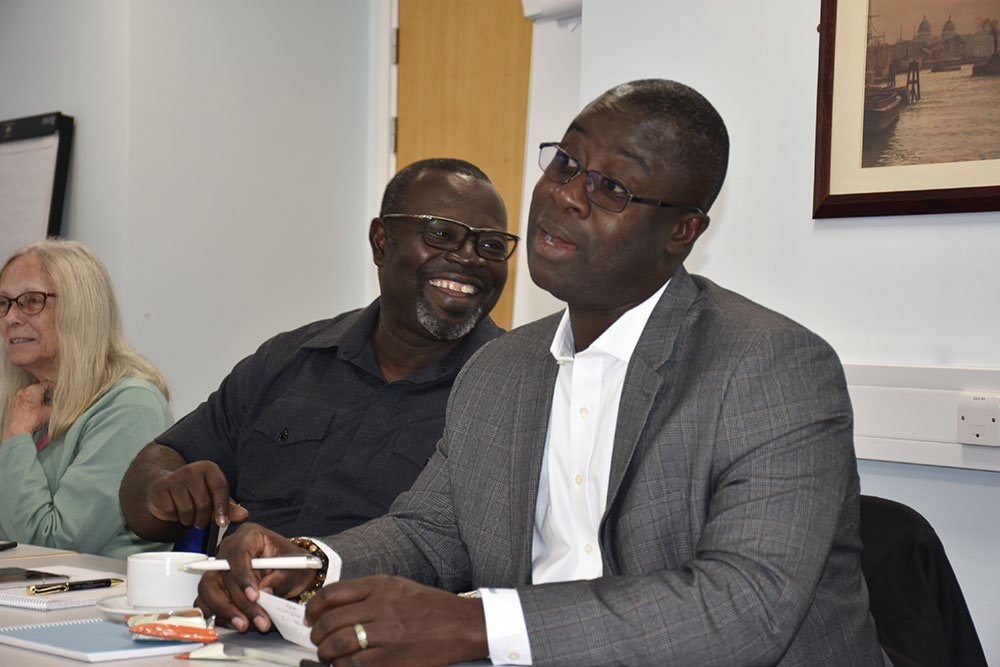
NRI hosted Members of Parliament (MPs) from the Ghanaian Parliament’s Committee on Food, Agriculture and Cocoa Affairs from 23-24 October. The four-member delegation was led by the committee chairperson, Hon. John Osei Frimpong accompanied by Hon. Godfred Seidu Jasaw, Hon. Eric Opoku and Hon. John Abbam Aboah Sanie.
The purpose of their visit to NRI was to explore partnership opportunities to leverage our expertise to co-innovate for sustainable and inclusive development of agricultural and food systems in Ghana. Discussions revolved around the MPs’ vision of increasing domestic food production to reduce food price inflation and reliance on food imports. The MPs also hope to promote investment in the agriculture and food sectors, including in priority value chains, to drive growth and employment opportunities at different levels of the food systems.
 The meeting was organised against the backdrop of record high food inflation in Ghana in recent months. The parliamentarians acknowledged the effects of climate change and other factors on agriculture and food systems in the country and hence the need to take these factors into account in policy and regulatory interventions. They were keen to discuss ways in which NRI could contribute, ‘to help us achieve our dream to improve agricultural sustainability in Ghana’, said Hon. Opoku. ‘If agriculture is properly leveraged, we can create so many opportunities to improve the livelihoods of our people. We hope you (NRI) can help us figure out how’, he added.
The meeting was organised against the backdrop of record high food inflation in Ghana in recent months. The parliamentarians acknowledged the effects of climate change and other factors on agriculture and food systems in the country and hence the need to take these factors into account in policy and regulatory interventions. They were keen to discuss ways in which NRI could contribute, ‘to help us achieve our dream to improve agricultural sustainability in Ghana’, said Hon. Opoku. ‘If agriculture is properly leveraged, we can create so many opportunities to improve the livelihoods of our people. We hope you (NRI) can help us figure out how’, he added.
Knowledge gaps and limited access to relevant evidence were identified as key factors limiting the MPs capacity to execute their functions effectively in policy formulation and budget approval for implementation and monitoring. Equipping the MPs and other policymakers with relevant evidence—a function NRI can contribute to—will therefore make a big difference. ‘Identifying and strengthening the evidence base is key to encouraging interest, political will and ultimately action on these issues’, Hon. Jasaw said. The meeting also acknowledged that the high turnover rates in Parliamentary Committees have notable implications for capacity building. For example, out of the 20 members on their committee during the last Parliament, only one continues to serve on it. The rest either lost their Parliamentary seats or were moved to other committees. It was also recognised that capacity building for legislators ought to be a sustained effort rather than one-off activities and should include the technical support staff of the Committees.
The meeting agreed on the critical need to identify, develop and strengthen channels for evidence generation and sharing, involving legislators, the Executive arms of governments and other key stakeholders in agriculture and food systems. Participants suggested entry points for action to be explored to drive this forward. These include the Commonwealth Parliamentary Committee, sub-regional parliamentary structures like the ECOWAS Parliament, and the soon-to-be launched African Parliamentary Network on Food Systems Transformation. The Economic Community of West African States (ECOWAS) is a regional political and economic union of fifteen West African countries.
Fundamental capacity building for effective policy development was also identified as a vital action point. In Ghana’s specific case, this could include mapping policies of relevance to the agricultural sector, for example, those that advance the implementation of major national and international commitments such as those under the Comprehensive African Agricultural Development Programme (CAADP). CAADP is an initiative aiming to help African countries eliminate hunger and reduce poverty by raising economic growth through agriculture-led development. In addition, the meeting acknowledged the need to promote the adoption of multistakeholder processes in agriculture and food systems development. Such approaches would target legislators and their technical support teams, other relevant parliamentary committees, and officials at the Ministry of Food and Agriculture (MOFA) in Ghana.
The MPs and NRI experts further discussed other specific areas of potential collaboration. These include addressing productivity issues in the cocoa subsector, mitigating risks from herbicide use, cost effective management of grain reserves, and catalysing investment in priority agricultural value chains, among others. Ghana’s cocoa industry has been facing challenges of declining productivity, high labour costs and competition for land and labour from the mining industry. Streamlining agricultural extension, understanding and reducing post-harvest losses and strengthening women empowerment in the face of vulnerabilities in informal food and trade systems also featured high on the agenda. Suggested action points included advocating for the inclusion of post-harvest losses in the extension curriculum and, providing feedback on a proposed extension bill to reflect environmental sustainability, and pre- and post-harvest issues.
 Hon. Jasaw encapsulated the legislators’ desire to collaborate and leverage NRI’s expertise with the following statement, ‘We should work together, co-create and co-innovate. We want to create a platform centred around NRI so that you can help us address agricultural sustainability and investment issues in Ghana’. The Committee will now review the recommendations from the meeting and on the basis of national and policy priorities, advise on the next steps. NRI is keen to advance this partnership in furtherance of our mission to generate, apply and share knowledge and develop skills for a sustainable world.
Hon. Jasaw encapsulated the legislators’ desire to collaborate and leverage NRI’s expertise with the following statement, ‘We should work together, co-create and co-innovate. We want to create a platform centred around NRI so that you can help us address agricultural sustainability and investment issues in Ghana’. The Committee will now review the recommendations from the meeting and on the basis of national and policy priorities, advise on the next steps. NRI is keen to advance this partnership in furtherance of our mission to generate, apply and share knowledge and develop skills for a sustainable world.

